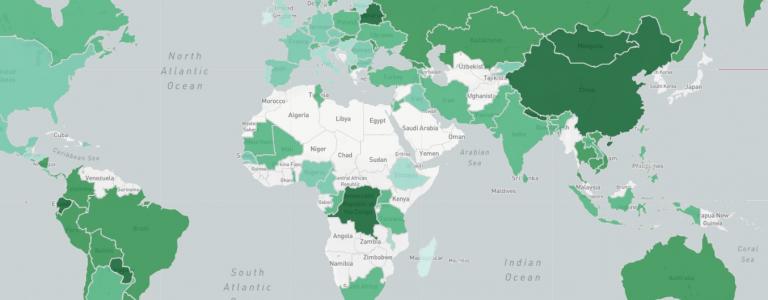Data Dashboard Visualizes SDG Status Across the World
New platform and indicator report highlight the importance of robust data reporting in policy-making.
23 JULY 2020, WINNIPEG, CANADA – Launched at sdg.tracking-progress.org, The Global SDG Indicator Platform offers people the chance to explore indicators for the 17 Sustainable Development Goals (or SDGs) across the planet. The platform not only gives users an engaging experience while answering, “Are we there yet?” regarding development but also highlights the importance of data availability in guiding policy decisions.
The platform incorporates approximately 100 data indicators used to measure progress toward the SDGs. The site and its companion report include information for each indicator, such as the indicator’s custodian organization, rationale, limitations, and data sources. By setting the platform’s “dashboard” feature to compare countries with similar conditions and trends, users can uncover examples where best practices may be found—and where actions on one goal may help or hinder achieving other goals.
A review of the Global SDG Indicator Platform and its companion report reveal:
- In line with recent statements from UN and world leaders, much of the planet is not on track to achieve the SDGs by 2030.
- SDGs 3 (Good Health and Well-Being), 7 (Affordable and Clean Energy), 12 (Responsible Consumption and Production) and 16 (Peace, Justice and Strong Institutions) had the highest number of countries reporting data.
- SDGs 5 (Gender Equality), 6 (Clean Water and Sanitation), 10 (Reduced Inequalities) and 14 (Life Below Water) had the fewest number of countries reporting data.
- There are as many approaches to assessing SDG implementation data as there are studies assessing SDG implementation. High-profile reports have either extrapolated trends out to 2030, graded countries’ trends A-F, set end values for SDG targets, ranked countries on SDG achievement from 0-100, or developed regional and/or sub-regional aggregates from indicator data.
- SDG target 17.18 specifically calls for capacity building around data to assess progress on the SDGs. It was assigned an early deadline in 2020 – recognizing that the data required to construct the indicators is instrumental in driving progress on the Goals. Failure to achieve this target this year will hamper efforts to get the 2030 Agenda back “on track.”
While data gaps may be related to the relative importance of an issue in a region – for example, countries where malaria is rare are unlikely to monitor Indicator 3.3.3.—others involve major indicators of societal well-being. For example, Indicator 8.6.1 tracks youth not in education, employment, or training—a key metric of potential youth labour market entrants as well as an indication of the size of a group that may be at risk of being “left behind.” The percentage of countries reporting on this indicator is under 65% in five of the six global regions.
About IISD
The International Institute for Sustainable Development (IISD) is an award-winning independent think tank working to accelerate solutions for a stable climate, sustainable resource management, and fair economies. Our work inspires better decisions and sparks meaningful action to help people and the planet thrive. We shine a light on what can be achieved when governments, businesses, non-profits, and communities come together. IISD’s staff of more than 250 experts come from across the globe and from many disciplines. With offices in Winnipeg, Geneva, Ottawa, and Toronto, our work affects lives in nearly 100 countries.
You might also be interested in
Why We Shouldn’t Give Up on the SDGs
The SDG framework may seem out of reach, but it’s the backbone of global cooperation.
Voluntary Local Reviews of Progress on the Sustainable Development Goals
A practical guide and resource list to help Canadian communities report on local progress toward the Sustainable Development Goals.
Plastics Treaty Must Remain Ambitious — We Can’t Give Up Now
The last round of the plastics treaty negotiations in Busan, South Korea, did not result in a deal, but the momentum is palpable. We must seize this opportunity and keep working toward an ambitious treaty that addresses the entire plastics life cycle.
What Will Happen at COP 29?
Talks at the 2024 UN Climate Change Conference (COP 29) will range from defining a way forward on finance through a new collective quantified goal (NCQG) to mitigation, and loss and damage. Ahead of negotiations in Baku, IISD’s Earth Negotiations Bulletin Team Lead Jennifer Bansard examines the agenda and breaks down what to watch as eyes turn to Azerbaijan.
